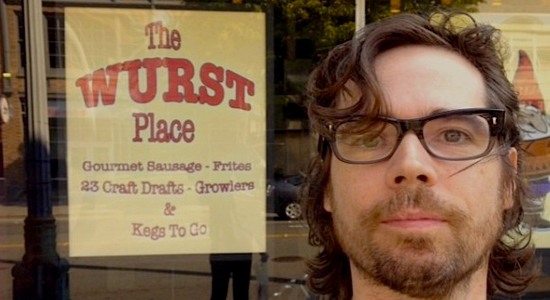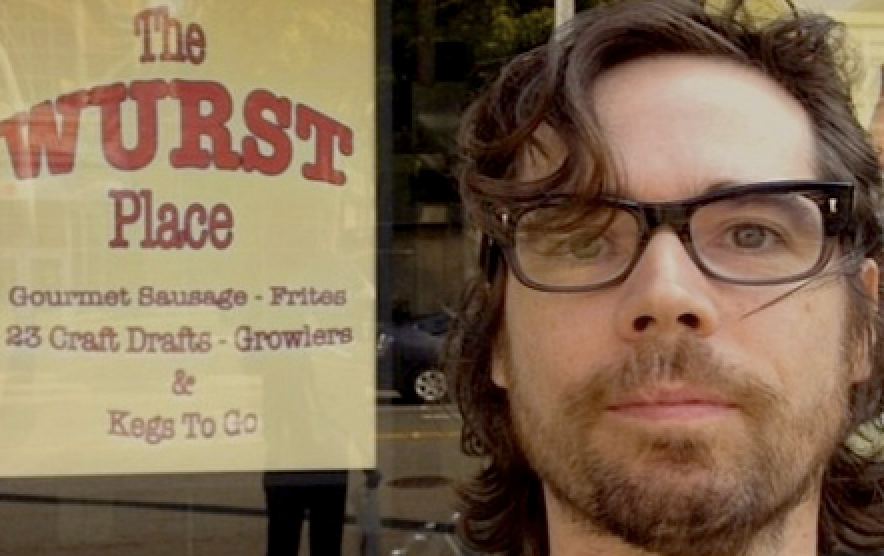
To call Superchunk drummer Jon Wurster “Superchunk drummer Jon Wurster,” while true, is a bit limiting. He also keeps time full-time (and tours constantly) with Bob Mould and the Mountain Goats, contributes hilarity to The Best Show On WFMU With Tom Scharpling and maintains one of the most reliably funny Twitter feeds (random tweet: “I have napped four times today. #HardcorePunk”). Superchunk is touring behind its 10th LP, I Hate Music (Merge), minus founding bassist Laura Ballance, who has retired from live shows due to hearing issues. (Wurster’s current Mould and former Robert Pollard bandmate Jason Narducy is filling in.) While traveling from gigs to home and to more gigs, Wurster answered a few questions about Ballance’s absence, Twitter, documentaries and his love of denim. He’s also guest editing magnetmagazine.com this week.
MAGNET: You’re basically a full-time member of three bands at this point. How do manage it all?
Wurster: There’ve been a few scheduling challenges, but things usually work out. It just means I’m constantly doing something, which is a good problem to have. The toughest thing is when two of the bands, usually Bob or Superchunk, play back to back at a festival. It’s hard on my body but really devastating to my ears. Also, being gone 250 days a year means my personal life essentially consists of me, a bowl of popcorn and DVR’d episodes of Locked Up Abroad.
Superchunk had close to a decade where you guys didn’t do much together, and now you’ve had two records in a relatively short time span.
Yeah, by 2001, I was kind of over it. Not the people in the band, just where we were 10 years in, for me, and what we were doing musically. I was tired of our sound. I didn’t really love (2001’s Here’s To Shutting Up), and the tour for it was pretty dismal—understandably so, coming on the heels of 9/11. By the last show (Washington, D.C, Nov. 26, 2001), I just felt like that era of the band was over. I wanted to call it a day—just have it be done so it wouldn’t be hanging over us. I wanted to play with other people and see what else was out there. But Mac (McCaughan) floated the idea of not ending the band, just having it not be the foremost thing in our lives. And that seemed like an OK idea. We played a few shows a year and recorded a handful of songs from 2001 to 2009, but we were definitely on hiatus. When the idea came to start playing more shows around 2009 or thereabouts, it might have been me who suggested doing a new LP. Jim (Wilbur) thinks it was. I definitely didn’t want to just go out and do a “Sweatin’ To The ’90s” kind of thing. Mac wrote a fantastic bunch of songs for (Majesty Shredding), so it was really exciting and inspiring to do it again. Same with this new record.
What has it been like to be in that sort of routine, for lack of a better word, again with the band?
It’s been great because we all have lives and we’ve grown up. Superchunk isn’t life or death anymore. When you’re young and in a band, everything is so incredibly important. For me it was, anyway. We take it seriously, but it’s not the end of the world if only 100 people come to see us in Richmond.
What is it about the dynamic between the four of you that allowed for that break and then this spurt of activity? You guys obviously didn’t break up and clearly have a bond.
We’ve remained friends. We don’t hang out much, if ever, but we basically lived together for 10 years in a van, so there’s really no need to at this point. When we get together to rehearse or record, it’s fun. We catch up and joke around. The being away from each other for large stretches makes the times you reconvene so much more enjoyable. I have the same experience with the Mountain Goats and the Bob Mould Band.
How did you end up finding out about Laura’s hearing issue?
I feel like she was really starting to talk about it when we toured for the last record. There were some venues in Japan that were really unsympathetic to loud music, and those shows were especially hard on the ears. This is in no way belittling her hearing problem, but I definitely have the same issues. I think I just always saw it as the price of doing this. My ears have been ringing since ’95, and I’ve been wearing heavy-duty earplugs the entire time.
She has said that she isn’t quitting the band and looks forward to making more records, but is there any doubt or worry in your mind that that could change?
I have no idea. I don’t worry about it because I honestly haven’t worried about Superchunk for the last 10 years. I love doing it when we do it, but when we aren’t doing it, I don’t think about it. We all have other things going on, and Superchunk is something nice to come back to every once in a while. If we don’t do anything again after this record, that’s OK.
Do you think Superchunk would continue if she said she had to quit?
I don’t know. The idea of touring without her came up before, and I was against it. I’m always a little skeptical when I see a band play with additional people or replacements—I know, I know, I’m a replacement—but we had a record coming out and we wanted to play shows to support it. I’ve been looking at it like R.E.M. when Bill (Berry) left. He was still part of the family, he just wasn’t there onstage. I have absolutely no idea what the future holds for us, and I like that.
Do you guys ever consider or talk about the band’s future, or do you just see how it plays out naturally?
We never made long-range plans, and I think that’s what has allowed us to keep going so long—that and there’s almost no chance of us ever getting dropped by our label.
What kind of legacy do you think the band has at this point?
I said this in the Merge book (Our Noise: The Story Of Merge Records) and some people—nobody in the band—seemed a bit annoyed by it: I think we will be remembered more for the way we did things than for our actual music. Superchunk’s made a lot of great music, but the fact that we basically did it ourselves most of the time and that two founding members went on to form one of the most successful independent record labels of the last 25 years is what we will most be remembered for.
You have a very active and hilarious Twitter feed. What is it about that form of communication that suits you or appeals to you?
I travel constantly, and it’s fun to comment on the crazy things I see every day. It’s also allowed me to take complaining to a new and more creative level.
We’ve learned a few things about you following you on Twitter. First of all, your love of denim. What’s the story there?
Actually, it’s just denim jackets. It started in 2009 when I bought a Levi’s jean jacket. I’d never really owned one before, and I began calling it The Denim Jacket™ on Twitter as a joke. I like how light they are and that the more you wear them, the better they look. But what I love most are the inner pockets. They hold everything I need to be a productive citizen: pens, keys, cell phone, airplane tickets, hand sanitizer, gum, rabies medicine.
You also have a fascination with Kiss, with one of the greatest series of tweets being the excerpts from Peter Criss’ autobiography (Makeup To Breakup: My Life In And Out Of Kiss). Explain that one.
My Kiss problem is interesting. I was a huge fan from ages 10 to 13, but then I completely lost interest. Just before the original lineup got back together in ’96, I became fascinated by the band’s inner workings. I wanted to know everything about how and why they did the things they did. I can’t say I listen to their music much, but I will buy any book or DVD about Kiss. Last year, I got an advance copy of the Peter Criss book, which I didn’t know was an advance copy. I thought it was already out. This book, he definitely lets it all hang out and leaves no bridge unburned. It really is only a notch below Mӧtley Crüe’s The Dirt in terms of hilarious accounts of drug-fueled sex—“We fucked nine times that night, even using the bidet, I had no idea what a bidet was”—and pure insanity. At one point, Peter’s pre-Kiss band escaped physical confinement in their creepy manager’s mansion only to be lured back and held captive again. As I got further into the book, I started tweeting the good bits. Someone at Peter’s publisher saw the tweets and became a little alarmed that I was tweeting passages from this book that wasn’t even out yet. But it turns out the co-author, Larry Sloman, was a fan of The Best Show, and he vouched for me and told them it might actually help sell more copies.
You tweet a lot about documentaries. What’s your favorite of all-time, and what’s a recent one you’d recommend?
My favorite documentary, maybe even my favorite movie of all-time, is called Overnight. It’s the story of Troy Duffy, a screenwriter/director/musician whose every dream comes true and the stellar flameout that follows. Recent documentaries I’ve liked include The Pruitt-Igoe Myth, Source Family, A Band Called Death, Weedle’s Groove, Kumare and Bus 174.
Lastly, and this pre-dates Twitter, but you’re known for your WordHate™ series where you rank annoying words. How did that get started?
I don’t think I can say it any better than I did the last time I stopped by the MAGNET offices. The good doctor’s prayer is still the WordHate™ gold standard.
Since I have at least your somewhat undivided attention, please do me the favor of chiming in on three. First up: “webinar.”
The word is terrible, but I recently attended one on corporate synergy and strategizing that was utterly fascinating.
“Artisanal.”
Well, that one’s OK because it has “anal” in it.
And, finally, “rockin’” as in “Wilbur is rockin’ that polo shirt.”
Awful. This interview is over.
—Matt Hickey








One reply on “A Conversation With Jon Wurster”
great job Matt!!!!!!!!!!!!!!!!!!!!!!!!!!!!!!!